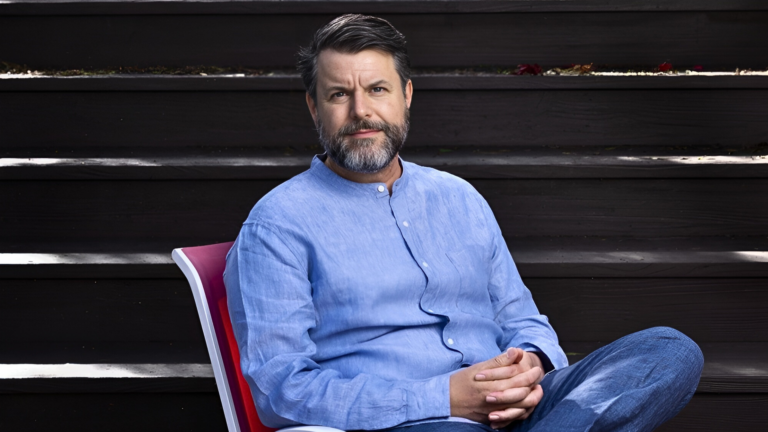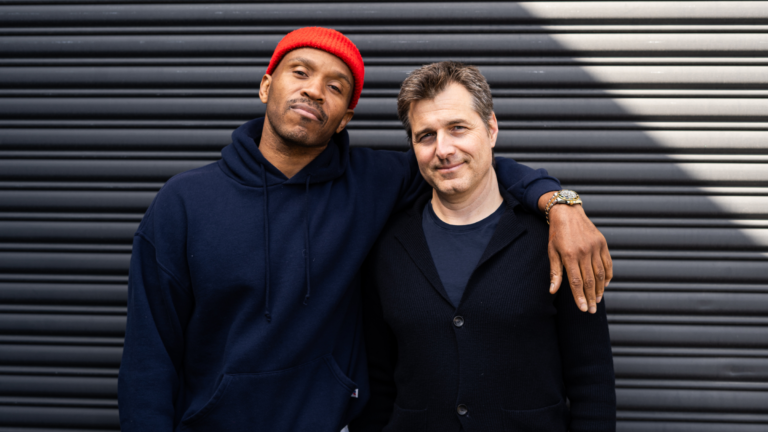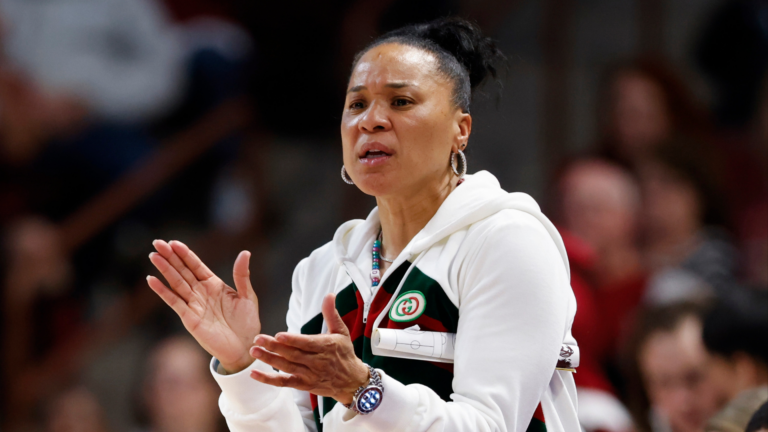This week’s conversation is with Charlie Webster, a broadcaster, journalist, creator, and endurance athlete.
Charlie is incredible and her body of work is extensive, to say the least. She was the first woman to host a televised Boxing World Heavyweight Title Fight, has hosted or produced at least seven different podcasts, created a TV documentary for BBC, has run 14 marathons and competed in 3 ironman triathlons – and that is just scratching the surface of her incredible life story.
In 2016, Charlie was put on life support and given 24 hours to live.
Charlie pushes the edges in everything she does. She understands deep pain, and how to work with it, which is one of the reasons I wanted to have her on. We dive right in to explore what drives her. What is she working towards? And how does she take care of herself amidst a life of constant “doing” and high achievement?
As you’ll hear in this conversation, Charlie is so much more than her accomplishments. Her honesty is striking, she’s navigated her life with incredible perseverance, and I think we all have something to learn from her journey of becoming.
“Look at yourself, face yourself, and get to know yourself. Because that’s what gives you the strength to persevere.”
In This Episode:
What drives her?
It’s changed over time. So if I look back now, I think it’s not a coincidence that I went into a very originally male dominated industry, an industry that was very, very hard to get into, but one that did give you a voice. So I think what drove me isn’t the same now. So what drove me originally, I think was feeling like I didn’t have a voice. Feeling like people coming from what I come from, don’t get those opportunities. People like me don’t get to experience those things. And I think that was a huge driver in a good and a bad way though, because it meant that I never let up, and nothing was ever enough because it was coming from a place of not being good enough.
Coping mechanisms and blame
Part of trauma is that we go into coping mechanisms, and we don’t even realize that it’s not normal what’s going on…I think there was a minimizing but also a blame, even though, and I think that’s very common for people have been, that are survivors of certain things or been victims, that you can somehow feel that it was partly your fault or that there was, I don’t know, an element of personalization to it. And one thing I realized is that it’s not, and especially with abuse, which is my other trauma, that you feel that it’s very much about you because you are, there’s something wrong with you and that’s what happened to you. But actually, abusers, every type of abuse I’ve ever seen, or abusers, they’ve always had more than one victim. And it’s because it’s about their behavior. But as a victim, you can very much feel like it was because you weren’t enough.
The aftermath of trauma is the toughest part
It’s what you are then left with, which is why I often talk about the fact that we don’t talk about the aftermath, because, I’d be interested to see what you think about this, because even in grief, I think this is the same. So if we lose somebody, the support is always there during the moment, say the actual incident, the death, the funeral, and then you are just left afterwards. And how are you supposed to deal with that? And the same with I was hospitalized, and I’m sure many people listening, have also been in situations where they were hospitalized for whatever reason. Mine was intensive care. I got tropical diseases and left me in a coma. Whereas some people might be dealing with cancer, and the support often is there when you’re going through chemotherapy or when I was in intensive care, everybody was there. And then when you come out of it, you’re like, okay, now what? And I think to me, that’s the hardest part of it.
Perseverance
Know that I’ve also had moments where I’ve wanted to just go, no, I don’t want to fight anymore, or I don’t want to do this anymore. It’s exhausting. It’s too much. So I definitely have had those moments. But they’re moments where they help you realize why and give you the strength to then push on. So I think if you just pushed all the time and didn’t have those moments where you wanted to give up, then maybe it wouldn’t be perseverance and you wouldn’t then push anyway…When you do have those moments, they aren’t very nice at all. They can feel really dark and lonely and defeating, but then that’s where you, I think, soul search and work it all out. And that to me is part of perseverance because then every time the kind of powerful motivation of what I want to do and the deep down passion to do what I do comes through and is always bigger than the part of me that wants to just back it all in.
Accepting your past
I don’t for a second believe that the past should be in the past or should stay in the past. It’s part of who we are. And when you push it in the past, it means that you are hiding a part of yourself. So sometimes the past is part of my present and how I behave. So recognizing that’s super important because then I’ll be like, okay, what, instead of retreating and isolating myself, actually maybe I should try and phone a friend because actually speaking to that friend might help me. Because it’s countering my behavior of what I’ve always done. And this is what I’ve done from a young age, not phone a friend, is isolate. That’s what I would do because I was brought up in an unsafe, chaotic home. So I would isolate myself.
You won’t always be perfect, and that’s okay
You always don’t get it right. And I think that’s been important for me to tell myself and I’m going to tell everyone else too. And you too, and everybody in this room that you might still fall into some of those unhealthy coping mechanisms because we’ve done them for so long. And I think that’s normal. So when I catch myself doing them and I try and not tell myself off because I think we all do that.
Unprocessed trauma
I think it’s our past trauma that we don’t deal with, which is not necessarily the trauma because every one of us in our lives has some kind of trauma and it’s part of life, but it’s the unprocessed, I’ll use that word, and the stuff we haven’t dealt with. Because actually if I think about myself, what the energy drain with me isn’t necessarily, or wasn’t necessarily the battle of self talk. It was the, because I still have a bit of that, but it was what I’d been through that I was carrying, that was the energy drain.
Introversion
I did some performance work as in performance coaching type stuff. But it was based on business and performance. And actually when I went through all that, because they do things about your personality and what your inner traits are, as I’m sure you’re aware, and I was an introvert, but I was the social version of an introvert. So I was a social introvert. So I was the most social introvert type that there is, if there was a type. Which means that you restore on your own. And I was like, oh my god. Honestly that realization is mind blowing because sometimes I don’t want to be with people even though I’m really social. But then I would feel bad and guilty about not being with people. But now I don’t feel bad and guilty because I understand it’s actually what I need.
Should we be teaching resilience?
I am the most resilient. I don’t need help. I’m resilient because I’ve gone through this. Just to wake up each morning just to get through everything you’ve got through, you need to be resilient. If there’s anybody out there that’s gone through some kind of trauma and doesn’t feel resilient, you are god damned resilient because you’ve got through each day. Sometimes it takes so much resilience to get through each day, but to me, I don’t think that’s what we should be teaching. Because being resilient, and again, I go back to myself, as a child I didn’t need to be taught resilience. I was the epitome of resilience. And what I needed to be taught was kindness to myself, empathy, understanding my own emotions, how to regulate my own emotions, how to view myself. Those are the things that I needed to be taught, not to be more resilient.
How her podcast with 50 Cent came to be
I remember we, me, 50, and the Flores twins who were in the show Surviving El Chapo, it’s about their story, when we all spoke, and we had our first, and by the way, they hadn’t decided whether they trusted me or whether it was me they were going to open up to. We just had an initial conversation and we spent hours talking about interestingly, trauma and mental health. And I think we ended up having such a deep conversation, all of us, that I think maybe that’s one of the things…he saw that I was strong. I didn’t treat him any differently than anybody else. And I can imagine a lot of people treat him in a certain way. In fact, talking of the title, I disagreed on a few things, and we had this amazing conversation to get to a creative point together with both our brains on what we were both happy with. And I totally respect him so much because he listened to me, and I think he saw that in me, but also compassion and care, and I really do care about what I’m doing and the integrity of it, and I can’t help it.


